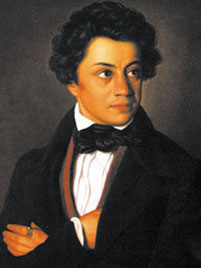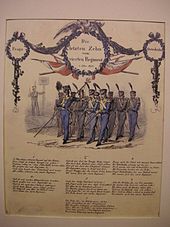Julius Mosen
Julius Mosen , actually Julius Moses (* July 8, 1803 in Marieney ; † October 10, 1867 in Oldenburg ) was a German poet and writer who is best known today as the poet of the Andreas Hofer song .
Life
Julius Moses was born as the son of Johannes Gottlob Moses, who worked as a cantor and schoolmaster in the parish of Marieney. The originally Jewish family can be found in Prague in the middle of the 16th century. The family name and its change by Julius in Mosen in 1844 has always been an occasion to associate the family with the Jewish religion until recently. But father and grandfather were Protestant pastors and cantors in Marieney and Arnoldsgrün. In Marieney there was also no Jewish community in which Julius Mosen's father is said to have worked, as it was read in the magazine Freie Demokratie on the occasion of his 200th birthday . The ancestors researched up to the 16th century also belonged to the Christian faith. He attended high school in Plauen and then the University of Jena to study law . In Jena he joined the Germania fraternity in 1822 . During a year-long stay in Italy , he received inspiration for his most important epic and dramatic works (Ritter Wahn , Cola Rienzi , The Congress of Verona) .
After completing his law degree, he worked from 1828 to 1830 in Markneukirchen as a legal assistant, from 1831 until he moved to Dresden as a judicial actuary in Kohren (today Kohren-Sahlis , City of Frohburg ) near Leipzig. It was here that two of his most important lyric works were created, The Last Ten of the Fourth Regiment (January 5, 1832) and the Andreas Hofer Song (March 11, 1832). In 1835 he settled in Dresden as a lawyer . Here he became a member of the Masonic Lodge To the Three Swords . During this time there were mainly dramas. In 1844 he moved to Oldenburg, where he worked as a dramaturge at the court theater . In the same year the family name Moses was changed to Mosen by Dresden ministerial decree. In 1846 he fell seriously ill with a rheumatic disease and was bedridden for the last twenty years of his life. Friedrich Wilhelm Graupenstein portrayed him on his death bed. His grave is in the Gertrudenfriedhof in Oldenburg.
family
Mosen was married and fathered several times. His older son Erich was killed on August 16, 1870 in the Battle of Mars-la-Tour during the Franco-Prussian War . His younger son Reinhard became the Oldenburg court librarian.
Artistic creation
His best-known poem is the text of the Andreas Hofer song (“Zu Mantua in Banden”), which is the national anthem of the Austrian state of Tyrol today. In the poem The Last Ten of the Fourth Regiment , he glorified the bravery of the Polish insurgents during the November Uprising at the Battle of Ostrołęka .
Three motives for suffering can be identified in the life and work of Mosen: the love of home, the struggle for freedom and finally the German-Jewish symbiosis that has been destroyed today.
In the memoirs he writes of the “attachment to the native soil of the Vogtland”, which attracts the eye, “as if there had to be some secret hidden far in the distance under the resin-dripping fir trees, where the mountains rise like terraces in dark blue that attracts us to itself and would like to reveal itself to us. "For him, the Vogtlanders are the" Saxon Tyroleans, only more frugal, only more active, only more persistent in pursuit of their goal, but just as staid, if coarse. "
He writes in his poem Heimweh , which has been set to music by several composers
Where on high pine
tops, That
so dark and so green,
Thrushes like to sit furtively ,
White and red the moss bloom:
To
my home in the distance I still hesitate so much today.
Where in the silver of fresh waves
the sun looks high,
the trout play secretly
In the alder green glow:
To
my home in the distance I still like to hesitate today.
Where the shepherd's fires burn,
The flock pulls through the forest,
Where all the rocks know me,
Over there the cloud flees:
To
my home in the distance I still hesitate so much today.
But my suffering cannot be changed,
Homesickness pulls me back,
Fate holds me
inexorably in foreign countries :
I still hesitate so much today about my
home in the distance
.
Works
- The song of the knight madness. An ancient Italian legend in twenty four adventures. Epos. Barth, Leipzig 1831. ( digitized version )
- Georg Venlot. A novella with arabesques. Schumann, Leipzig 1831. ( digitized version) (Newly edited and introduced by Paul Kroedel, Leipzig 1941)
- Heinrich the Finkler, King of the Germans. A historical drama in five acts. Literary Museum, Leipzig 1836. ( digitized version )
- Ahasver, epic poem. Fleischer, Leipzig 1838. ( digitized version )
- Pictures in the moss. Novell book. Brockhaus, Leipzig 1846. ( digitized part 1 ), ( part 2 )
- Emperor Otto the Third , drama, 1842
- Cola Rienzi . the last tribune of the Romans. A tragedy. 1842
- The Brides of Florence , drama, 1842
- Bernhard of Weimar. Historical tragedy in five acts. Landes-Industrie-Comptoire, Weimar 1854. ( digitized version )
- Duke Bernhard. Historical tragedy. Brockhaus, Leipzig 1855. ( digitized version )
- The prince's son. Tragedy. Schulz, Oldenburg 1858. ( digitized version )
- The Verona Congress. Novel. Duncker & Humblot, Berlin 1842. ( digitized first part )
- My grandfather's courtship. Novella. Publishers of the Volksbildungsverein, Wiesbaden 1904.
Monuments to Julius Mosen
- Mosenturm observation tower at the Pöhl dam
- Monument on Julius-Mosen-Platz in Oldenburg
- Julius Mosen monument and a grammar school named after him in Oelsnitz / Vogtl.
- Memorial stone on the castle and plaque on the residential building in Kohren-Sahlis
- Memorial plaque in Innsbruck
- Monument, plaque and path in Marieney
literature
- Julius Mosen . Ernst Balde, Cassel 1854 ( MDZ Reader ).
- August Schwartz : Mosen, Julius . In: Allgemeine Deutsche Biographie (ADB). Volume 22, Duncker & Humblot, Leipzig 1885, pp. 359-368.
- Reinhard Mosen: Julius Mosen. A biographical sketch . Schulze, Oldenburg 1877.
- Ludwig Geiger : Julius Mosen as a playwright . In: Stage and World . 1903, pp. 811-820 ( digitized version ).
- Werner Mahrholz: Julius Mosen's prose. A contribution to the literary history of Romanticism and Young Germany (= research on modern literary history 41). Duncker, Weimar 1912.
- Fritz Alfred Zimmer : Julius Mosen. A German poet and folk man . Heimatwerk Sachsen, Dresden 1938.
- Fred Frank Stapf: Julius Mosen. The Vogtland poet of the Andreas Hofer song. Kerschensteiner, Lappersdorf 1995 (2nd, extended edition Kerschensteiner, Lappersdorf 2001, ISBN 3-931954-06-4 ).
- Hans-Wolf Jäger : Mosen, Julius. In: New German Biography (NDB). Volume 18, Duncker & Humblot, Berlin 1997, ISBN 3-428-00199-0 , p. 171 f. ( Digitized version ).
- Julius-Mosen-Gesellschaft eV: Mosen directory. Julius-Mosen-Ges., Marieney 2000.
- Part 1: Works .
- Part 2: Secondary Literature .
- Dieter Seidel: Julius Mosen. Life and work. A biography. Kerschensteiner, Lappersdorf 2003, ISBN 978-3-931954-09-3 .
- Wolfgang Schrader, Hilmar Raddatz: Julius Mosen (1803-1867). The collection of the Vogtlandmuseum Plauen on the life and work of the poet . Kerschensteiner, Lappersdorf 2003.
- Helge Dvorak: Biographical Lexicon of the German Burschenschaft. Volume II: Artists. Winter, Heidelberg 2018, ISBN 978-3-8253-6813-5 , pp. 496-499.
Web links
- Literature by and about Julius Mosen in the catalog of the German National Library
- Works by Julius Mosen in the Gutenberg-DE project
- Julius Mosen in the Internet Archive
- Brigitte Emmrich: Mosen (until 1844 Moses), Julius August . In: Institute for Saxon History and Folklore (Ed.): Saxon Biography .
- The President of the Tyrolean Parliament is commemorating the 200th birthday of Julius Mosen, the poet of the Andreas Hofer song.
Individual evidence
- ^ Hans-Wolf Jäger: Mosen, Julius. In: New German Biography (NDB). Volume 18, Duncker & Humblot, Berlin 1997, ISBN 3-428-00199-0 , p. 171 f. ( Digitized version ).
- ^ Dieter Seidel: Julius Mosen. Life and work. A biography. Ed. Julius-Mosen-Gesellschaft e. V., 2003, pp. 345-348.
- ↑ Detlef Storz: Celebrating the 200th birthday of the poet and fraternity member Julius Mosen (Germania Jena) . In: Internet Addendum 4 to the edition of the Burschenschaftliche Blätter 3/2003 ( PDF ).
- ^ Wolfgang Schrader, Hilmar Raddatz: Julius Mosen (1803-1867) . Ed .: Vogtlandmuseum Plauen. 1st edition. Kerchensteiner Verlag, Lappersdorf 2003, p. 14-16 .
- ^ Dieter Seidel: Julius Mosen. Life and work. A biography. Plauen 2003.
- ^ Egbert Koolman: Mosen, Reinhard. In: Hans Friedl u. a. (Ed.): Biographical manual for the history of the state of Oldenburg . Edited on behalf of the Oldenburg landscape. Isensee, Oldenburg 1992, ISBN 3-89442-135-5 , pp. 482-483 ( online ).
- ↑ Illustration of the monument
- ↑ Illustration with description
| personal data | |
|---|---|
| SURNAME | Mosen, Julius |
| ALTERNATIVE NAMES | Moses, Julius; Mosen, Julius August |
| BRIEF DESCRIPTION | German poet and writer |
| DATE OF BIRTH | July 8, 1803 |
| PLACE OF BIRTH | Marieney |
| DATE OF DEATH | October 10, 1867 |
| Place of death | Oldenburg |






